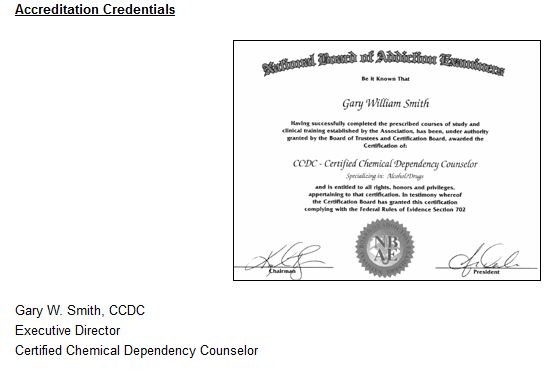But a key part of that crisis has been the emergence of former Narconon employees who have come forward to detail the network’s deceptive practices. Last year, we published the first damning accusations by Narconon Arrowhead’s former president, Luke Catton, who has become a vocal source about Narconon’s methods (and he has a new book out).
And now, another formerly high-ranking Narconon employee has gone public with damning new allegations that are quickly having an effect. Because of Eric Tenorio’s allegations about the way Narconon has certified its employees as drug counselors, some of those certifications are being revoked as a new investigation is being launched, the Underground Bunker has learned.
We spoke earlier today with Karla Taylor of the National Association of Forensic Counselors, who sounded furious that Narconon websites are misusing the NAFC’s logo and are giving the appearance that the NAFC has accredited Narconon’s program, which is not the case.
She has also received a formal complaint alleging that Narconon employees fraudulently obtained individual certifications as Certified Chemical Dependency Counselors (CCDC). Taylor says she is taking the complaint very seriously and that several Narconon employees have already been sent revocation notices, and she’ll be investigating the rest of Narconon’s CCDC certifications.
“I take this extremely seriously. The integrity of this organization is of the utmost importance. There’s a zero tolerance policy for any mendacious claim of any kind, and I have no intention to let this slide by,” she says.
Although Taylor did not identify the complainant, Eric Tenorio tells us he’s the one who alerted NAFC that its logo and certifications were being used improperly by Narconon.
Tenorio got involved with Narconon in 1996 at its first Oklahoma facility, in Chilocco. He eventually became the executive director of a Narconon center in Michigan. He left Scientology in 2010, and only this week began speaking out about what he’d seen in his years at Narconon.
Like Catton, Tenorio says the Narconon business model is built on deception. Potential patients or their loved ones are usually roped in through generic-looking websites and telephone operators who say nothing about Narconon’s relationship to Scientology. Families are also not told that patients won’t actually receive drug counseling, but instead go through the same Scientology training given to new church members.
As we’ve seen in court documents coming out of numerous recent lawsuits against Narconon facilities, promises are also made about medical personnel being on hand, when, for example, the Georgia center’s medical director had never, in several years, set foot in the facility. Narconon facilities are instead staffed by former patients who are offered jobs once they graduate.
Tenorio and Catton both became Narconon employees that way, and then both received CCDC certification. Tenorio received his in 2002, and he says the process was fraudulent. A man named Kent McGregor, he says, administered the test by giving everyone the answers ahead of time.
Two years later, Catton says he passed the CCDC test the same way.
“I took it in 2004 at Arrowhead. I had the answer key, written in Kent’s writing, and that was the only thing I studied to take the test. I, and other people, we didn’t even read the book,” Luke says.
Tenorio points out that even if he and his fellow staff members had taken the test honestly, none of them was really qualified anyway. NAFC requirements are lengthy, and require not only college degrees, but extensive experience in the medical field. He and Catton say that Narconon officials just fudged that information on affidavits they submitted with the test scores.
We reached Kent McGregor today, who denies that he gave out answers to the tests. “That’s not true. We did some open-book study but I didn’t provide answers,” he tells us.
“Yeah, there was open-book study the week before,” Catton says when we tell him McGregor’s statement. “But the day of the test there was an answer key that gave us all the answers. That’s how I passed the test. I only read Kent’s answer key. I didn’t read the book. We were shocked that three people actually failed the tests.”
Taylor says she is taking these allegations very seriously, and has already sent out half a dozen revocation notices, and will be reviewing all of Narconon’s CCDC certifications.
She points out that even if the tests were performed properly, she is shocked to learn that Narconon has experienced several deaths which have produced multiple investigations and civil litigation. NAFC has heard from none of the Narconon staff, who are required, under their CCDC certifications, to notify NAFC within 30 days of investigations or litigation.
We called today and left a message for Gary Smith, who is executive director of Narconon Arrowhead and prominently displays the letters CCDC after his name on websites. He also prominently displays his CCDC certificate on a Narconon website…
But Karla Taylor says that’s a very improper display. Smith’s certificate is an older form that hasn’t been used for seven or eight years, and it refers to a previous testing scheme under the National Board of Addiction Examiners, which the NAFC has superseded.
In August, however, as negative publicity mounted about the deaths at Narconon Arrowhead, Smith put out a lengthy statement defending the facility and pointing out its “20 CCDC’s (Certified Chemical Dependency Counselor, Certified through the National Association of Forensic Counselors and The National Board of Addiction Examiners)”
We wanted to ask Smith, why hadn’t he notified the NAFC of the deaths at his facility and subsequent investigations and litigation? And does he realize that it might put his own certification in jeopardy?
Instead of calling us back, he called Karla Taylor and left a message. She tells us that she is not going to call him back, but instead plans to restrict all of her future dealings with Narconon in writing.
She made that decision in part because of the way she was treated when she called up Narconon Vista Bay, a facility in California. She showed us how the rehab center’s website is improperly displaying the NAFC logo, as if it had accredited the facility.
Taylor says that only individual professionals may display the logo on their websites, as long as the logo is unaltered and links directly to the NAFC website itself. Instead, various Narconon websites are displaying the logo as if the facility itself was sanctioned by NAFC, which isn’t the case. And there’s no link to NAFC.
“I’m finding that the NAFC logo is being used to make it look like we’re endorsing their program. At no time does the NAFC endorse any program by anyone anywhere,” she says. She was also unhappy about the way Narconon Vista Bay handled her phone call, and the website has not changed.
Taylor is asking all Narconon websites to remove the NAFC logo, she’s reviewing all of Narconon’s CCDC certifications, and she also asked Kent McGregor to removed language on his website (for the PITA Group, Inc.) which refers to his relationship with NAFC. (He complied and changed his website immediately.) She says McGregor has no relationship with the NAFC. He tells us that he did have one at one time, but Taylor denies it.
Tenorio, meanwhile, has sent letters to Oklahoma’s legislators and governor about McGregor, Smith, Narconon and the NAFC.
We’re still waiting to see if Smith will call us back. Taylor, meanwhile, promises to keep us informed as her investigation goes forward.
—————–
Posted by Tony Ortega on February 21, 2013 at 15:05








